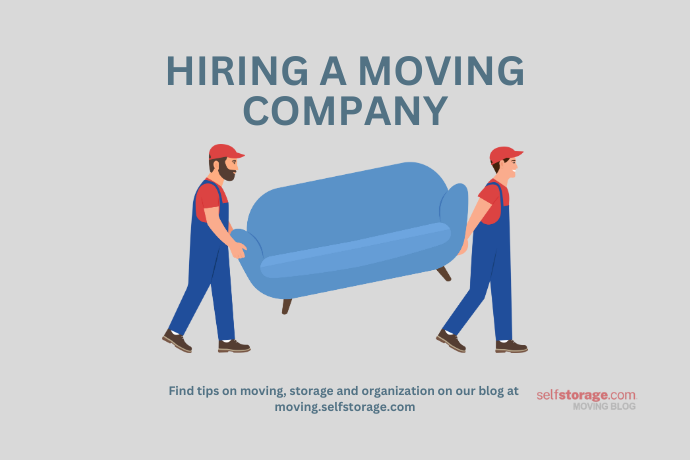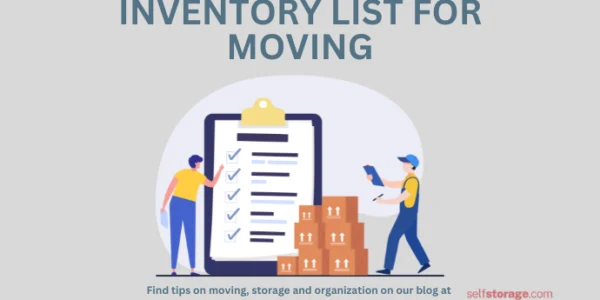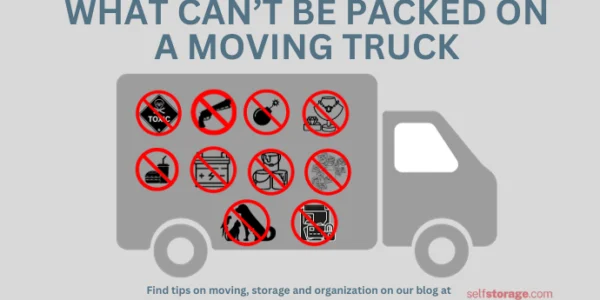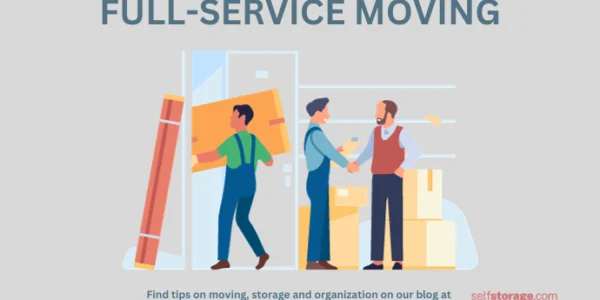What’s covered in this article – click on a link to learn more:
- Why Hire a Professional Moving Company
- Assess Your Moving Needs
- Research the Company
- Get More Than One Estimate
- Ask About Extra Costs
- Verify Credentials and Licensing
- Moving Insurance and Valuation
- Read the Contract Carefully
- Ask the Right Questions
The average American moves nearly 12 times throughout the course of their life despite economic disturbances like inflation, recessions, market fluctuations and even the pandemic.
And even though new trends are consistently influencing how individuals relocate, lately fewer people are moving.
According to Forbes, 2021 Census Bureau data shows the moving rate has steadily declined in the past five years from roughly 34.9 million residents to just over 27 million, which is 8.4 percent of Americans.
With fewer people choosing to move every year, DIY moves are more popular than ever for those looking to save on expenses. Of course, professional movers still have considerable interest with about a quarter of all moves left to moving companies. In fact, roughly 23 percent of people utilized moving company services in the past year.
Why Hire a Professional Moving Company Anyway?
Moving can be a daunting task, but hiring a professional moving company can make the process significantly smoother. What can you expect from a moving company? The benefits of choosing professionals are numerous, starting with their expertise in handling all aspects of the move. Professional movers are trained to pack, load, transport, and unload your belongings, ensuring that everything arrives at your new home intact.
Efficiency is another key advantage. Professional movers have the experience to streamline the moving process, saving you time and effort. They are equipped with the right tools and resources to handle your items with care, minimizing the risk of damage. This efficiency is especially crucial when dealing with large or fragile items that require special attention.
Relocation is a stressful experience, there’s no doubt about it. Entrusting the job to experts can allow you to focus on other aspects of the move, such as settling into your new home. Professional movers can handle the logistics, leaving you with peace of mind and reduced stress (a significant advantage of hiring the pros).
On the flip side, there are potential risks associated with hiring unlicensed or inexperienced movers. Without proper training and licensing, movers may lack the necessary skills to handle your belongings safely. Unreliable movers might also engage in unethical practices, such as hidden fees or even taking your possessions hostage, which is a common moving scam. It’s crucial to thoroughly research and vet potential moving companies before making a decision.
To avoid these risks, take some time to figure out how to hire a moving company before you embark on a new adventure in a foreign location. There are some common mistakes to avoid when hiring a mover. So, take note of these tips to save yourself any hassles in an otherwise exhausting process. You’ll thank us later!
Common Mistake #1: You Didn’t Assess Your Moving Needs
Before you start searching for a moving company, it’s essential to assess your specific moving requirements. This evaluation will help you determine the type of services you need and the level of expertise required from the moving company.
Consider the scope of your move, including the distance, size of your belongings, and any special items that require extra care. Long-distance moving costs range from $600 to over $10,000, depending on whether you’re packing items yourself or opting for full-service movers.
Understanding your moving timeline is equally important. Whether you have a flexible schedule or a tight deadline, communicating your timeline to potential movers will help you find a company that can accommodate your needs. Some moving companies may offer expedited services, while others may have limited availability during peak moving seasons. And know that if you’re thinking of moving between May and September, you should plan for higher prices for professional movers.
Common Mistake #2: You Didn’t Research the Company
When it comes to hiring a mover, researching and identifying reputable moving companies is a critical step in the process. At a minimum you should do the following things for each moving company you consider:
- Ask for recommendations from friends, family, or colleagues who have recently moved.
- Review online reviews on platforms such as Yelp or Google to get valuable insights into past experiences of other customers.
- Check with the Better Business Bureau to ensure that the moving companies on your list have a positive track record, are BBB-accredited, have a good rating and minimal complaints. If the moving company isn’t listed with the BBB, look for one that is.
You should also review your rights and responsibilities before you hire a mover. Failing to carry out initial research can put your belongings in the hands of the wrong people.
Common Mistake #3: You Chose the First (and Lowest) Estimate
It’s a rookie mistake to settle for the very first quote you receive. Especially if it allows you to save money on the move. You should receive estimates from at least three companies to do your due diligence. Here are red flags to watch out for with obtaining estimates:
- Getting an estimate over the phone. No company can accurately give you a thorough estimate without actually seeing your stuff in person.
- Asking for a deposit up front. Most reputable moving companies will not require you to pay a deposit up front. You should only pay upon delivery so that you have control over when you see your belongings.
- They give you a verbal quote. It’s a lot easier for unscrupulous movers to go back on their word or conveniently “forget” what they’ve quoted. Getting an estimate in writing means you can avoid any nasty surprises on moving day.
- The estimate is vague. Your estimate should include as much detail as possible, in addition to a breakdown of all the costs included and not included in the price.
- They don’t ask many questions. The weight of your stuff is a large part of the overall price. A thorough estimator should ask what you plan to take from your current home to the next one. They should also check storage places (cupboards, drawers, garages, etc.) so that your estimate is as accurate as possible.
Common Mistake #4: You Forget to Ask About Extra Costs
Do you live in a high-traffic area or on the 10th floor of an apartment building? Is your street too narrow for a moving truck to maneuver? When requesting quotes, be sure to ask about potential extra fees that could affect your estimate. This includes things like handling bulky items, navigating stairs, or transferring your items to a smaller truck for delivery. Having a clear understanding of the costs involved will help you avoid unexpected expenses.
Having the movers pack your things is usually an extra cost as well. Keep in mind that you may pay inflated prices for boxes and packing materials, in addition to time and labor. However, if you pack your belongings yourself, it may affect the liability if something goes wrong. A mover generally isn’t responsible for damage to items that they did not pack themselves.
Common Mistake #5: You Fail to Verify Credentials and Licensing
It goes without saying licensed movers are more likely to adhere to industry regulations and provide a higher level of service. The U.S. Department of Transportation Federal Motor Carrier Safety Administration (FMCSA) issues a U.S. DOT number to licensed interstate movers. To ensure you are dealing with a reputable and legal business, verify the moving company’s license through protectyourmove.gov. If you need to file a claim against the company, you’ll need to have the company’s U.S. DOT number. Staying in state? Check with state-level enforcement resources.
You could also look for moving companies that carry the American Moving and Storage Association’s ProMover logo which are vetted and have been given a seal of approval from an industry trade association.
Common Mistake #6: You Don’t Understand Moving Insurance and Valuation
Make sure you understand how moving insurance works. Reviewing the insurance and liability coverage offered by a moving company is essential to safeguard your belongings during the move. Different companies may offer varying levels of coverage, so it’s crucial to understand the types of protection available.
Federal law states that movers going from one state to another must offer two different liability options referred to as valuation coverage: full value protection moving insurance and released value protection (basic coverage).
Understanding the claims process is equally important. In the event of loss or damage, know how to file a claim and the timeframe within which it must be submitted. Being informed about insurance coverage will give you peace of mind during the move.
Common Mistake #7: You Didn’t Read the Contract Carefully
Before finalizing your decision, thoroughly read and understand the moving contract. The contract should outline all the details of the move, including pricing, services provided, and payment terms. If any terms in the contract are unclear, don’t hesitate to ask for clarification. It’s essential to have a clear understanding of your agreement with the moving company to avoid misunderstandings.
Pro tip: You should never sign a blank moving contract. Another red flag to avoid is accepting a “guaranteed quote” which is not accurate.
Typically there are three different types of moving contracts:
- Non-binding estimate: Provides a rough idea of what the move will cost but does not lock in a price, which gives the company leeway to increase the price based on the weight of your inventory or tack on additional fees.
- Binding estimate: Locks in a flat rate for moving services and is based on specific details of your moving inventory. This is where it’s critical to have the company perform an in-home consultation to make sure it’s as accurate as possible.
- Not-to-exceed estimate: A lower percentage of moving companies offer not-to-exceed estimates, which is a binding option based on the total weight of your shipment. It differs from a binding estimate because the final cost of your move will not increase from the quoted amount, even if the actual weight of your inventory is less than predicted.
Common Mistake #8: You Didn’t Ask the Right Questions
Once you’ve made it this far, you might think it’s time to pull the trigger and hire a moving company. There’s one last step, though, and it could make or break your entire moving experience. During interviews or consultations with potential moving companies, ask a series of questions to gather relevant information. Some questions to consider include:
- How long has the company been in business?
- Have any complaints been filed against the company with the BBB?
- Do you have references?
- What types of moves do they specialize in?
- Are their employees trained and experienced in handling specialty items?
- Do they have their own equipment and vehicles?
- What measures do they take to ensure the safety of your belongings?
- How do you take inventory of belongings?
- What is your cancellation policy?
- What kind of liability coverage does your company provide? Can I get additional insurance?
- What happens if something breaks or gets damaged?
- What is your claim process like?
Additionally, seek references or testimonials from past customers. A reputable moving company should be willing to provide references that can vouch for the quality of their services. Contacting these references will give you firsthand insights into the company’s reliability and professionalism.
You’re All Set! It’s Time to Plan the Move
Once you’ve selected a moving company, it’s time to plan the logistics of the move. Coordinate with the company to set a moving date and establish a timeline for the various stages of the move. Clear communication is key to ensuring a smooth transition.
If you have specific requirements or concerns, such as the need for storage or the handling of fragile items, communicate these details in advance. Planning ahead will help the moving company allocate the necessary resources and personnel to meet your needs.
Hiring a professional moving company is a crucial decision that requires careful consideration. The benefits of expertise, efficiency, and reduced stress make the investment worthwhile. However, the risks we mentioned highlight the importance of thorough research and due diligence.
By following these guidelines, you can make an informed decision when hiring professional movers. Remember that your choice of a moving company significantly impacts the overall success of your move. Use the provided tips to navigate the process confidently and enjoy a seamless transition to your new home. Safe moving!





